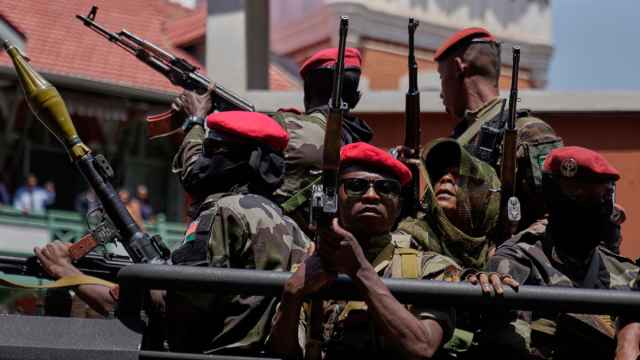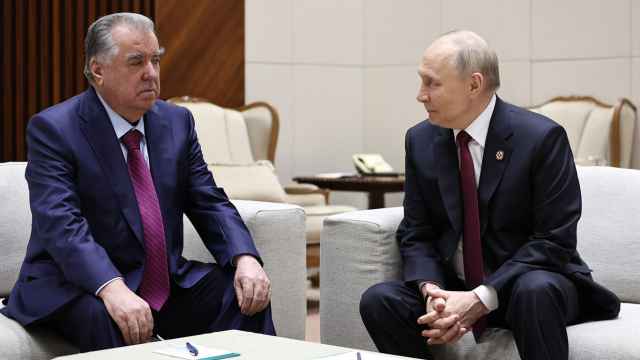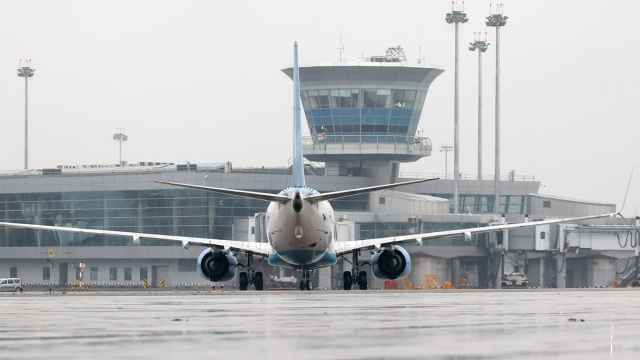Media reports of a Russian military presence in Syria have stirred high-profile accusations that Russia is reinforcing its support for Syrian President Bashar Assad, President Vladimir Putin's long-term ally who has been battling opposition forces in his country since 2011.
The reports, which are sketchy and not substantiated by any solid evidence, were quickly rebuffed by Putin himself, who stated on Friday that it was premature to talk about a military intervention into the conflict in Syria in order to fight the Islamic State terrorist group there, although he admitted that Russia was supplying the Syrian army with military equipment and weapons.
Assad’s regime is embroiled in intense fighting against Western-backed opposition groups and, in the meantime, against the Islamic State. The Kremlin has repeatedly called on the U.S.-led coalition of Western and Gulf states that has called for Assad's ouster to consider the Syrian president an ally in the fight against Islamic State, which it refuses to do.
But while selling equipment under governmental contracts is a common international practice, deploying troops to the area would take the conflict to a different level, which the Russian ruling elite has no intention of doing because it might draw the country into a drawn-out and expensive war, pundits told The Moscow Times.
“After the Soviet operation in Afghanistan, our public opinion has certain prejudices against sending troops to fight for ideals that are foreign to us,” said Nikolai Kozhanov, an international relations expert at the Moscow Carnegie Center think tank.
Troops or No Troops?
Several Western media outlets claimed that Russian military were fighting alongside pro-Assad forces in Syria last week, citing photos posted on social networks of what was reported to be a Russian armored vehicle and Russian airplanes.
The media also attributed their conclusions to a YouTube video containing footage from an unidentified Syrian TV channel in which a soldier can be heard shouting something that resembles two Russian words. In addition, an unidentified activist from a rebel group was cited as telling British newspaper The Times of London that “the Russians have been there a long time.”
On Friday Putin denied the claims.
“To talk about us being ready to do it [carry out a military operation and deploy troops to Syria] is premature. We're supplying enough support by [providing the Syrian army] with military equipment, training troops and arming them,” he was cited as saying by state news agency RIA Novosti.
The next day, U.S. Secretary of State John Kerry called Russian Foreign Minister Sergei Lavrov to “voice concern” over the possible Russian military build-up in Syria suggested by media reports. The State Department said that an increased Russian military presence could provoke an escalation of the conflict by creating a risky confrontation with the international coalition that is fighting the Islamic State in Syria.
But Lavrov reiterated Putin’s statement in conversation with Kerry, the foreign minister's spokeswoman said Monday. He also called on the U.S. to collaborate with the Syrian government in order to fight the Islamic State, calling the Syrian government army “the most effective force.”
Not Worth It
Russia's number one interest in Syria is protecting the regime of Assad, whom Putin has supported all along, agreed experts polled by The Moscow Times, and providing state forces with weapons and equipment is aimed at doing just that. The status quo is important, because among other things, Russia operates a naval station in the Syrian city of Tartus, — the country's only military outpost in the Mediterranean — and doesn't want to lose it.
“There's been a shift in the quality of the equipment we are supplying — we have started to sell more and better equipment to the Syrians,” Kozhanov from the Carnegie Center told The Moscow Times. “Apparently Russian officialdom is raising the stakes in the game, but it's unlikely they would change the strategy [and deploy troops],” he said.
Right now there's simply no need to: The situation may be difficult, but Assad is still a long way off defeat, Kozhanov said.
Drawing Russia into a long war would be a serious risk for the Kremlin, if it were to deploy troops to Syria, even with a loyal leader at stake, said Alexei Makarkin, deputy head of the Center for Political Technologies, a Moscow-based think tank.
“We could recall Afghanistan, when the U.S.S.R. entered it in order to replace one ruler with another and then leave. It took them more than nine years [to leave],” he told The Moscow Times in a phone interview.
Right now the goal is to protect Assad with limited involvement, “and to ensure there are prospects for Assad after the [civil] war ends,” Makarkin said.
Mystery Explained?
Since Russia is selling equipment to the Syrians, there are certainly some military personnel present who are responsible for maintaining the equipment and teaching local troops how to use it, Kozhanov said.
The photo circulating in the media that purportedly shows Russian military personnel in Syria was taken from the VKontakte social media account of Ivan Strebkov, who Internet users speculated could be a member of the Russian military. The military men in the photo could be those assigned to work with the equipment, said Yevgeny Buzhinsky, a military expert at the Moscow-based PIR Center think tank.
“Or maybe one of our ships was entering the Tartus port, and the sailors were disembarking onto land,” he told The Moscow Times in a phone interview.
On the photo, four uniformed and armed men are pictured with a military vessel seen behind them. A red star is painted on the vessel, and the photo location is tagged as Tartus, Syria. The photo was posted on Sunday.
Buzhinsky also believes there might be military advisors and experts present in Syria — but that is not the same as having troops there, he said: They help with the equipment Russia sells to Syria, which is completely legitimate.
“Getting involved in a military conflict by sending troops is extremely shortsighted, especially now,” the military expert added.
Contact the author at [email protected]
A Message from The Moscow Times:
Dear readers,
We are facing unprecedented challenges. Russia's Prosecutor General's Office has designated The Moscow Times as an "undesirable" organization, criminalizing our work and putting our staff at risk of prosecution. This follows our earlier unjust labeling as a "foreign agent."
These actions are direct attempts to silence independent journalism in Russia. The authorities claim our work "discredits the decisions of the Russian leadership." We see things differently: we strive to provide accurate, unbiased reporting on Russia.
We, the journalists of The Moscow Times, refuse to be silenced. But to continue our work, we need your help.
Your support, no matter how small, makes a world of difference. If you can, please support us monthly starting from just $2. It's quick to set up, and every contribution makes a significant impact.
By supporting The Moscow Times, you're defending open, independent journalism in the face of repression. Thank you for standing with us.
Remind me later.





